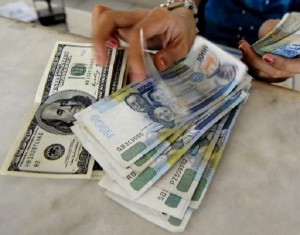Strong peso not good for local artists–solons

Sen. Vicente Sotto III and House Minority Leader Danilo Suarez expect a bigger influx of Hollywood films and foreign concert artists next year as a stronger peso would make it more profitable for theater owners and events organizers to bring in imports in lieu of local artists.
Analysts expect the peso to soar to P39 to the dollar next year—its highest level in more than 10 years—as robust consumer demand fuels the Philippine economy while the US and European markets remain in the negative.
“I believe the government should address this problem soon or many of our local talents will go abroad and the industry workers will lose their jobs,” said Suarez in a phone interview.
More ‘disincentives’
Sotto said the strong peso would add more “disincentives” to local film producers.
Article continues after this advertisement“Why make a film which will cost P40 million to produce when you can get an American movie for $100,000 (P4.1 million)? Making films is a gamble because no one knows what movie will make money or not. If you take into account that half of what you will earn will go to taxes, it’s no wonder only a few dare to bet their money on producing films,” said Sotto.
Article continues after this advertisementEven the recording and television industries are under threat with the strong
peso.
Sotto said a strong peso would further spur event producers to bring in more foreign acts to the detriment of local artists. “If foreign artists are coming here almost every week, just imagine how many will come when the peso hits 39,” he said.
Suarez said that even local telenovelas would be affected by the strong peso. Suarez said TV producers would likely opt to buy more foreign-produced soap operas and syndicated shows as these would become cheaper.
“I’ve received reports that some local telenovelas will be axed because it will be cheaper to buy a finished package than make one from scratch here,” said Suarez.
Heavy taxes and piracy
A report by the National Statistical Coordination Board showed that local movies used to have a 20-percent share of the local market from 1960 to 1999 with an average annual output of 140 movies. The industry’s share has been cut to 11 percent with only 73 films made annually from 2000 to 2009 largely due to the heavy taxes, foreign competition and piracy.
“It’s no secret that my brother (Vic Sotto) makes films only during the MMFF (Metro Manila Film Festival), otherwise he will not make money. With high taxes, competition from Hollywood and pirated videos, the entertainment industry in this country is more of a sacrifice than a business,” said Sotto.
Suarez noted that while the amusement tax was slashed from 30 percent to 10 percent three years ago, most cities continue to charge the old rate.
“We should force a stricter enforcement of the real tax rate,” said Suarez who also proposed more generous tax breaks for the industry.